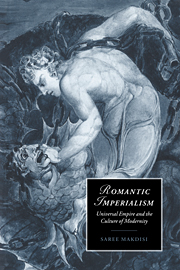Book contents
- Frontmatter
- Contents
- Preface and acknowledgments
- 1 Introduction: Universal Empire
- 2 Home imperial: Wordsworth's London and the spot of time
- 3 Wordsworth and the image of Nature
- 4 Waverley and the cultural politics of dispossession
- 5 Domesticating exoticism: transformations of Britain's Orient, 1785–1835
- 6 Beyond the realm of dreams: Byron, Shelley, and the East
- 7 William Blake and the Universal Empire
- 8 Conclusions
- Notes
- Bibliography
- Index
- CAMBRIDGE STUDIES IN ROMANTICISM
4 - Waverley and the cultural politics of dispossession
Published online by Cambridge University Press: 29 September 2009
- Frontmatter
- Contents
- Preface and acknowledgments
- 1 Introduction: Universal Empire
- 2 Home imperial: Wordsworth's London and the spot of time
- 3 Wordsworth and the image of Nature
- 4 Waverley and the cultural politics of dispossession
- 5 Domesticating exoticism: transformations of Britain's Orient, 1785–1835
- 6 Beyond the realm of dreams: Byron, Shelley, and the East
- 7 William Blake and the Universal Empire
- 8 Conclusions
- Notes
- Bibliography
- Index
- CAMBRIDGE STUDIES IN ROMANTICISM
Summary
The clans retain little now of their original character, their ferocity of temper is softened, their military ardour is extinguished, their dignity of independence is depressed, their contempt of government subdued, and the reverence for their chiefs abated. Of what they had before the late conquest of their country, there remain only their language and their poverty.
Samuel Johnson, A Journey to the Western Islands of ScotlandOur geographers seem to be almost as much at a loss in the description of this north part of Scotland, as the Romans were to conquer it; and they are obliged to fill it up with hills and mountains, as they do the inner parts of Africa, with lions and elephants, for want of knowing what else to place there.
Daniel Defoe, A Tour Through the Whole Island of Great BritainIt would be only a small exaggeration to say that the images that many of us associate with the Scottish Highlands have their origins in Walter Scott's first novel, Waverley. Scott started writing Waverley in 1805, though he dropped it for several years and only completed it in 1814. The novel, which is set mostly in Scotland during the Jacobite Rebellion of 1745, not only presented to its nineteenth-century readers a romanticized view of the Jacobite rebels and their leader; it offered, virtually for the first time, an altogether new series of images and representations of the Scottish Highlands.
- Type
- Chapter
- Information
- Romantic ImperialismUniversal Empire and the Culture of Modernity, pp. 70 - 99Publisher: Cambridge University PressPrint publication year: 1998

